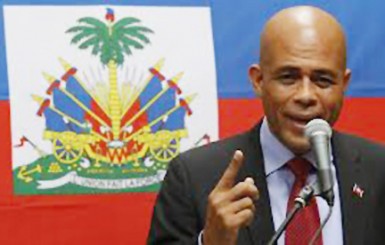Haiti would like to take full advantage of its accession to the Caribbean Community and its President has called on the region for it to seen and treated as an opportunity.
“I would like to say that Haiti should be seen and treated as an opportunity. Despite its difficulties, it represents a good opportunity for the region.” This was the appeal of the President of Haiti, Michel Martelly, Chairman of Caricom, on the occasion of the Twenty-Fourth Intersessional Meeting of the Conference of Heads of Government of Caricom, held in Port-au-Prince on February 18, 2013.
Martelly emphasised that Haiti represents a market of nearly ten million people, potential natural assets and a rich cultural heritage that can make a genuine contribution to the growth of Caricom economies. He said that “Ultimately, a Haitian economy that works best serves the interests of Caricom thus expanding its market and its possibilities of being more competitive.”

He said that Haiti can be a good provider of agro-food products, including fruits and vegetables, and handicrafts. It can also be a good outlet for products from the region.
According to Martelly, “Our economy needs to be supported by productive investment in order to be viable. Significant advances are being made in this direction. I would like to mention the most recent Haitian-Jamaican company, Haitian Broilers, specializing in the production of poultry feed, which dared to believe in the revival of the country.. It has made an investment of (US)$10 million, which generated 80 direct jobs and more than 3,000 indirect jobs in such an important industry as raising chickens.
This fine example should be welcomed and followed.”
Martelly also pointed out that some of the trading partners outside the community have adopted new legislation that, while trying to protect the health of their population, has reduced access for Haitian producers to their markets.
He said that Haitian products will have to provide all the information on their composition and origin in order to access certain markets so he would like to propose a project on the traceability of agricultural and non-agricultural products to eventually allow their producers to comply with international regulations.
In the communiqué after the meeting, Caricom said that the conference welcomed the project submitted by Haiti for electronic traceability of products. The conference requested additional information and the communiqué said that the governments of Haiti and Guyana undertook to hold further bilateral discussions on the matter.
Martelly, in his presentation at the opening of the conference, stressed the urgency to implement innovative financing mechanisms. He hoped the Green Climate Fund does not take long to become operational since programmes in the fields of conservation and management of forests can no longer wait; particularly in the case of Haiti, whose forest cover has been reduced to less than 2%.
He considers this a national emergency, which has resonance even at a regional level, so he said he has declared 2013: ‘the year of environmental and agricultural recovery.’
Martelly also referred to the problem of movement of persons and goods. He said, “Our countries are in a paradoxical situation: so near and yet so far!” He said that among many other factors, the lack of a dedicated transport system is the heart of this problem.
He said that often goods manufactured within the community must pass through a country outside of the community before reaching their destination in another member state of the community and under these conditions the inter-community trade will fail to reach an acceptable growth level. Martelly proposed a project to create a Caribbean merchant navy, as a solution.
He said that the transport situation leads to another equally important problem, that of the mobility of people within the Community.
In the context of the free movement of skilled persons, he welcomed the progress made in favour of holders of diplomatic and official passports, and hoped that these provisions would extend to contractors and socio-professionals while waiting to avail it to other categories of workers within the Community.
However, President Martelly noted that the quest for sustainable development is fraught with pitfalls of all kinds. He said, “We must avoid, for example, the traps that transnational organised crime represents. The sovereignty of our country is sometimes violated by powerful non-state actors engaged in illicit drug trafficking and using our territory as transit points.
“Faced with this threat, we must strengthen our cooperation in order to defeat these criminal networks that too often manage to open breaches in our security, to threaten whole swathes of our economic systems and cause social and political upheavals.
“Given our limited resources, it is appropriate that we receive support in this struggle from the States affected by this trade, including equipment and the implementation of development programmes for our agents.
“The drug trafficking also extends its tentacles to the financial sector. We must ensure each day a better protection to our banking system to combat money laundering and corruption.
During this Summit, we have the opportunity to refine our analysis of these blights and to propose new control tools”, he stated.





